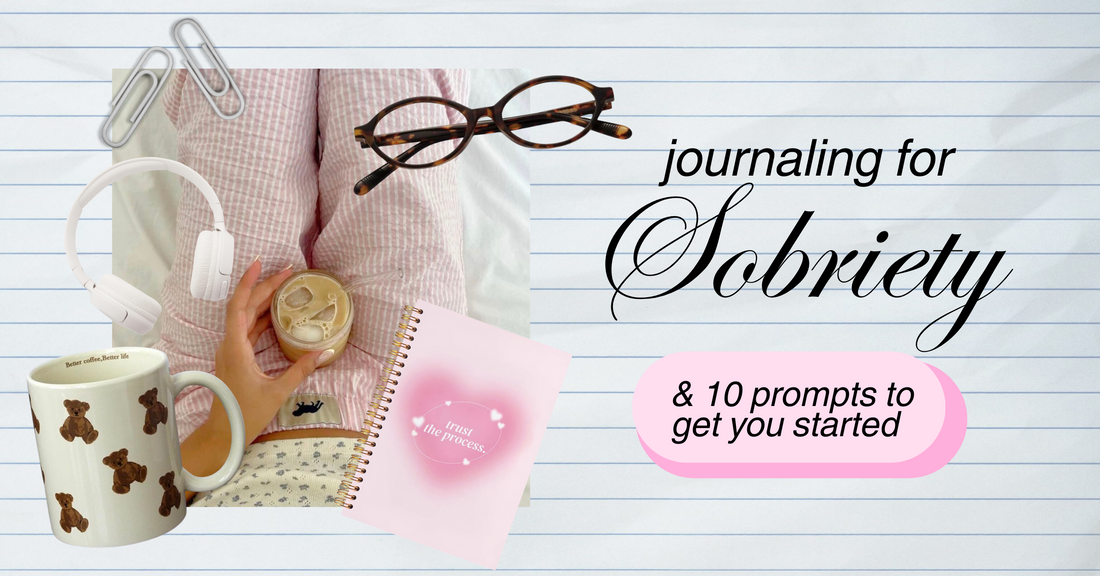
Sobriety Journaling Prompts To Heal Addiction
Journaling isn’t just “dear diary” and lists, it’s a tool that primes and rewires you mind for long term sobriety. When you write with a strategy and strong intention, it creates levels of self-awareness, structure, and emotional release that prevent a future relapse.
Sobriety has a way of forcing us to face ourselves in ways that may be uncomfortable, but by writing down these observations on a daily basis, we become empowered to accept where we are now and plan for an alcohol free future we look forward to living.
Why Journal?
Identify Emotions:
writing teaches you to name, understand, and process what you’re feeling in a safe space
Builds Self Trust:
Sticking to a daily ritual proves to yourself that you *actually can* follow through and gives you the confidence to make bigger and more life changing promises to yourself.
Creates Structure:
Rituals provide routine and stability helping you feel grounded and supported when everything feels like it’s falling apart.
Pattern Interference:
Journaling gives you an outlet to turn to in situations that would normally result in a relapse.
Increases Self-Awareness:
When you’re writing every day, you start to notice patterns, cravings, inner dialogue, mood fluctuations, and your energy levels. Being aware of these gives you your power back.
Tracks Milestones:
Keeps a written record of progress you can celebrate (yay!)
Identifies Triggers:
Helps you notice which situations, people, environments, or feelings spark cravings and create a plan to overcome them.
Types of journaling practices:
Gratitude journaling:
We have a nervous system designed to spot danger and identify problems so making a habit of writing a daily gratitude list shifts your focus onto what you do have and reprograms you to feel supported on hard days. A bed to sleep in, running water, a healthy body, etc.
Trigger Tracking:
Notice who, what, when, and where your triggers come from empowers you to avoid situations and experiences that keep you stuck. Over time, it becomes a tool helping you understand how to navigate your new sober life.
Milestone Journaling:
Our brains love being reminded of the progress we’ve made so keeping track of your wins will give you the confidence to stick to your sobriety. (I recommend celebrating every win because you deserve it!!)
Vision Journaling:
“If you don’t have a clear vision of the future, you’ll always repeat patterns from the past” -Dr. Joe Dispenza
Dream big and stay excited for the beautiful unfolding that occurs when you stick to your goals
Emotional Release Journaling:
Unexpressed emotions live within the body and subconsciously effect the actions we take and the behaviors we engage in so practices like “shadow work” give us the opportunity to remove them. You may find that the simple act of writing down how you feel makes your negative emotions seem smaller and have less control over you.
10 Journal Prompts from my 20 day sobriety journal “Unhooked”
CLARITY:
- What are the 10 worst things I’m experiencing in my life as a result of my drinking/using?
- What sort of life do I envision for myself free from addiction?
OVERCOMING LIMITING BELIEFS:
- I fear I’ll lose ______ when I get sober.
- If I was to be completely honest with myself about my substance use, I’d admit _______
CRAVINGS:
- How did alcohol/drugs benefit me? Why did I continue using despite the negative consequences?
- Is there another way I could provide the things I got from drinking/using to myself?
ENVIRONMENT AUDIT:
- List the environmental factors that contribute to my triggers and impulses (who/what/where/why)
- What small changes can I make to my living environment that will set me up for success this week?
SELF LOVE:
- How can I reward myself each day for sticking to my sobriety?
- Write a list of non-physical traits that you love about yourself
Bonus tips for consistency:
Keep it short. 2-3 sentences is enough especially if you’re overwhelmed
Pair journaling with an existing habit like sitting down and having a cup of coffee in the morning
Download a guided journal (click here for the 20 day sobriety mindset journal)
Make it cozy. Candle, blanket, fav drink. A vibe
Long Term benefits
Proof of Growth: your journal becomes a timeline of progress
Stronger Resilience: spotting patterns helps you recognize when you need extra space/support/time alone/self care/etc.
Emotional Healing: writing regularly makes big feelings less overwhelming
Future Perspective: looking back shows how far you’ve come and how much further you’ll go in the future
Self Compassion: re-reading your words builds kindness towards yourself
Journaling is a companion for your sobriety-one that’s always available judgement free. Go grab a notebook and write one line that perfectly sums up why you want to stay sober & keep adding to it. Over time these small daily moments create a powerful record of your healing.
